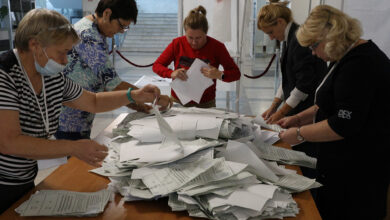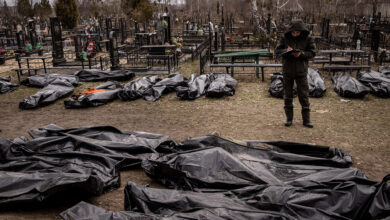Electoral violations reported during Saturday’s referendum can be blamed on poor logistical preparation that could not handle an unprecedentedly high turnout, said a human rights activist.
“This time, the irregularities are due to the lack of expertise,” said Ahmed Fawzy of the Egyptian Association for Community Participation Enhancement whose members monitored the poll in 17 provinces. “We need to have better logistical preparations.
“The number of polling stations could not absorb the number of voters. We should have been better prepared and those in charge of running the process had to be better trained,” added Fawzy who estimated the turnout at 60 percent.
“There is an unjustified urge to rush things in the transitional period,” said Fawzy
“Neither the armed forces nor the Supreme Electoral Committee were prepared for the referendum and we warned against that,” he said, adding that his group had also received complaints from judges that they were only given their polling station assignments the morning of the referendum.
The high turnout speaks to a major turning point in Egypt’s political culture. For decades, the authoritarian grip of the post-1952 regimes sanctified political apathy. As the results of most polls were determined ahead of time, the majority of Egyptians had disengaged from politics and boycotted the ballot box. In the last parliamentary elections, which were pervasively rigged in favor of Hosni Mubarak’s ruling National Democratic Party, human rights groups said the turnout was less than 10 percent.
On Saturday, Fawzy’s group recorded several violations including unstamped ballots, the lack of black curtains to give voters privacy, and last-minute campaigning outside and inside polling stations by Islamists.
Monitors also noticed that voters were not forced to dip their fingers in indelible phosphoric ink at some polling stations, while in other parts of the country the ink was easily removed. In the meantime, Fawzy’s advocacy group alleged that clerks supervising the polls encouraged people to vote in favor of the amendments.
“It was Habib al-Adly and former officials who imported this ink. These people were corrupt and imported an erasable ink. In any respectable country, the phosphoric ink does not come off before 48 hours,” added Fawzy.
At 8AM polling stations opened their doors to millions of Egyptians who lined up for the first time in queues that were as long as 2 km in some spots. As soon as a voter made it past the gate of the polling both, a clerk would ask for the person’s ID and record the name and number manually. In several booths, voters were casting their ballots en masse.
This lack of privacy allowed political groups, namely the Muslim Brotherhood, to spread political propaganda and influence people’s choices inside polling stations, according to an EACPE report.
Fawzy added that Salafis asked voters to cast a “yes” vote in Suez, claiming that such a vote could counter-weigh Copts who are among those who want an entirely new constitution including the removal of Article 2. This contentious article, which stipulates that Sharia Law is the primary source of legislation, has been criticized by most Copts as discriminatory and not conducive to a secular state.
“These are racial and sectarian slogans,” said Fawzy. “The practices of the Muslim Brotherhood and Islamist groups are not promising signs.”
Other Human rights groups leveled more serious allegations against Islamists.
According to Hafiz Abou Saeda, secretary general of the Egyptian Organization for Human Rights, Islamists took over two polling stations in the Upper Egyptian town of Naga Hammadi, preventing voters from entering and also stuffing ballots. Abou Saeda could not specify which group these Islamists belonged to.
All Islamist groups, including the nation’s most organized opposition bloc the Muslim Brotherhood, the Salafis and the notorious al-Jama’a al-Islamiya have been calling for a “yes” vote.
Forty-five million Egyptians are eligible to vote today on a set of army-backed constitutional amendments that ease restrictions on presidential candidates, limit presidential terms to two and ensure full judicial monitoring of elections. Nevertheless, these amendments failed to draw a national consensus.
The modifications have divided legal experts and political forces into two camps: one that called for a “yes” vote, hoping it would expedite the transitional period and send the military back to the barracks, and another demanding an entirely new constitution.
“Today’s experience shows that we need to revamp the electoral process to make it more organized and more compact,” said Abou Saeda, who suggested the number of polling stations be increased in future elections.
“If the turn-out remains like that, we should hold the presidential and parliamentary elections over many days,” said Fawzy. “With this number of polling stations and this number of [judges] we cannot handle such a turn out.
“We should not be shy and ask other countries to help us financially and logistically to administer the electoral process,” added Fawzy.




